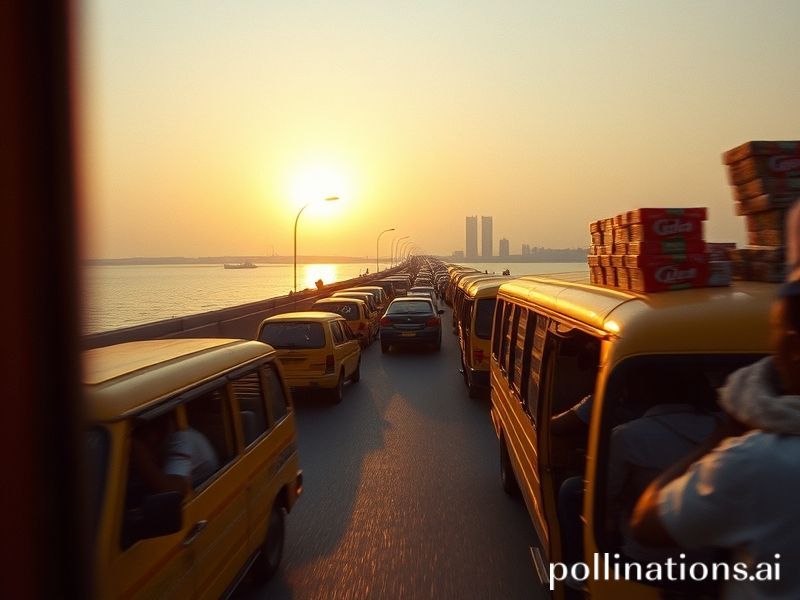Lagos: The Megacity That’s Stress-Testing the Planet’s Future—With a Soundtrack
Lagos: The City That Swallowed Optimism for Breakfast
By a correspondent who once tried to outrun Third Mainland traffic with a bicycle, a prayer, and a half-charged phone
They say every city has a heartbeat. Lagos, on the other hand, has arrhythmia. It stumbles, it races, it flat-lines at 3 a.m. in gridlock, then miraculously revives with the next blast of Afrobeats from a danfo bus whose muffler is held together by pure sarcasm. From the outside, it looks like urban planning’s final exam scribbled on a napkin after three espressos. From the inside, it is the planet’s most convincing proof that human beings can adapt to anything, including their own bad decisions.
Globally, Lagos matters because it is the dress rehearsal for a crowded, climate-stressed future. The UN projects the world will add two billion more urbanites by 2050; Lagos alone is on track to triple in size by then, absorbing an extra 20 million souls into a coastline already nibbled by Atlantic erosion. If you want a preview of how coastal megacities will cope—or not—when sea-level rise meets population rise, buy a ticket to Murtala Muhammed, close your eyes, and hold your breath. (The holding-your-breath part is optional; the airport’s air-conditioning works only on leap years.)
Economically, the city is Nigeria’s ATM and its overdraft notice rolled into one. It produces a third of the country’s GDP in a landmass smaller than London, yet 70 percent of its residents live in informal housing that would make a zoning lawyer weep into his craft gin. Tech bros in Yaba call it “Silicon Lagoon” with a straight face, while the generator fumes outside their co-working space politely remind them that reliable electricity is still a 1999 dream deferred. Still, venture capital keeps arriving, lured by the same logic that makes people buy lottery tickets: someone, somewhere, will hit the jackpot before the lights go out again.
Diaspora-wise, Lagos exports its DNA the way Silicon Valley exports bad TED Talks. Peckham in London, Houston in Texas, Guangzhou in China—all have neighborhoods where pepper soup competes with local beer for shelf space, and where remittances flow back home like guilt wrapped in dollars. Those transfers, worth roughly $24 billion a year, help keep Nigeria’s naira from achieving complete freefall, proving that family loyalty can occasionally outperform monetary policy.
Culturally, the city has become the world’s unofficial Afrobeats capital, a title it stole from Accra in broad daylight and then invited everyone to the after-party. When Wizkid sells out the O2 Arena or Burna Boy wins a Grammy, Lagosians nod with the weary pride of parents whose kid finally moved out of the basement. Yet the same Spotify streams that fund mansions in Lekki can’t buy drainage in Makoko, the floating slum where children learn to paddle before they can walk and where “waterfront property” is less marketing slogan and more existential threat.
Climate conferences in Glasgow or Dubai love to cite Lagos as a cautionary tale: Look, they say, this is what happens when carbon emissions meet zero urban governance. They never add that the average European emits four times more carbon than the average Lagosian, but facts are like danfo buses—there’s always another one coming, whether you catch it or not.
So what does Lagos teach the rest of us, huddled in our own slightly less chaotic cities? That resilience is just desperation wearing nicer shoes. That innovation can sprout in a blackout. And that if humanity is going to survive the 21st century, we might need a sense of humor darker than the diesel haze hanging over Oshodi bus stop.
Optimists insist Lagos will “build back better.” Pessimists know it will simply build forward—upward, outward, sometimes sideways—until the Atlantic reclaims its own. The rest of us will keep watching, half-horrified, half-impressed, trying to decide whether the city is a miracle or a warning. Spoiler: it’s both. Pass the pepper sauce.







